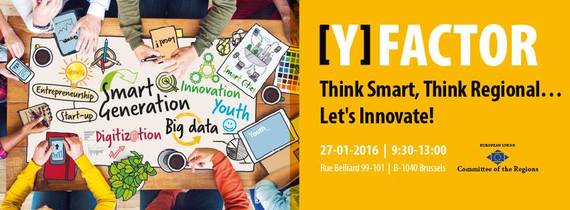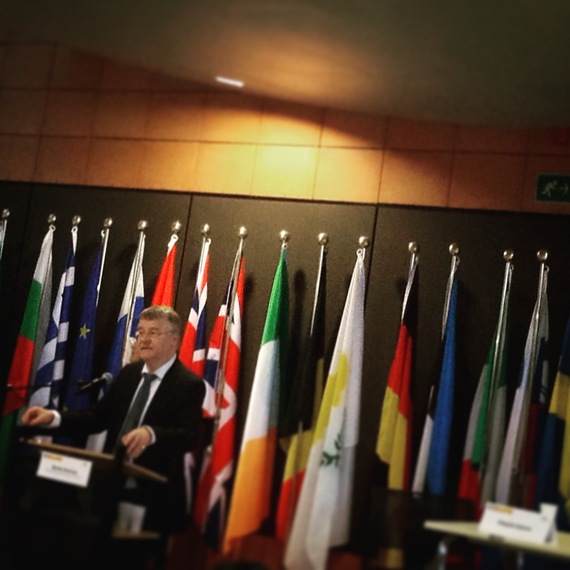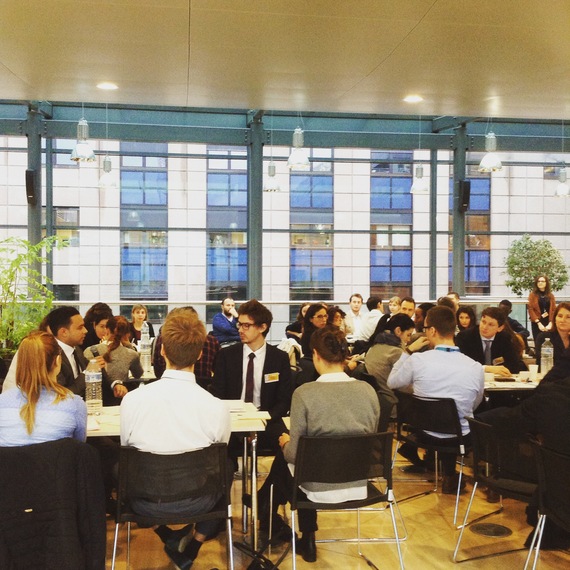Young successful start-uppers together with experts on innovation coming from local and regional authorities came together at the 3rd edition of [Y] FACTOR. The conference, hosted and organized by the young professionals at the European Committee of Regions in Brussels, aimed to discover synergies on strengthening the 'smart' and innovative components within European cities.
The debate generated from the event was a product of passion. The young professionals of the European Committee of the Regions took undertook the challenge of the [Y]FACTOR as a team building activity, but most importantly, with the desire to afford to entrepreneurs and those fascinated by innovation a meeting with representatives of European cities and those of the business sector within an EU institution. The life of a young professional in the 'euro bubble' can be quite demanding, and organizing yet another event requires a high awareness of other endeavors put forth during the already busy EU quarter. In an attempt to bring relevance and an added value, the organizers aimed to bring forth something close to their professional identity; their young age and a good understanding of the local needs and developments around EU Member States. Whilst the many challenges facing the EU today do little to ensure a prompt response at the supra-national and national level, the local (glocal) level may serve as a microcosms for testing possible solutions that can benefit the EU as a whole.
The forum granted a nexus between entrepreneurial realities and local political representatives. In the same vein, the format proposedfacilitated interaction between presenters and participants. This translated into an exchange of views on innovation and the development of 'smart cities' within EU Member States and a lively debate on the role the young generation of entrepreneurs.
Markku Markkula, President of European Committee of the Regions, stressed the need to innovate to invent the desired future and quality of life for people in Europe. The newly found definition of billionaire, could very well be connected not to the money one earns but the number of people's life one changes for better.
In defining the meaning behind 'smart cities' the people's factor was underlined. Indeed, only an environment full of skilled and connected people can make for a 'smart city'. People need to be part of the process in facing global challenges with the use of ICT. Indeed, resilience and sustainability are key component for an environment to be able to face global challenges.
The role of local and regional authorities (LRAs) in fostering entrepreneurship and the added values of young entrepreneurs was explored first among smaller groups of eight, in a newly proposed format within the [Y]FACTOR series, later returning to the whole room and share comments and ideas.
Daugilas Kakaras (mCity, Itero IT) warned against the difficulties that are often associated with entering into business with government structures. The implementation phase-because of long bureaucratic procedures-can take ten times as long as offering the same innovative services to private business sectors. Kakaras noted that the private sector is more flexible and willing to adapt to times and available new technologies. Practical advices to young entrepreneurs were to research the market with the view of responding to specific needs. Replicability differentiates a simple and good idea, from a brilliant solution to problem X.
Ingrid Willems (iMinds and DataScouts) provides as part of her everyday business life, insights about the ecosystems that businesses are operating in. To her, building a network of creative hubs with vibrant ecosystems allows for bridging creativity and technological know-how that ultimately bring about new products. In Europe, there are a few cities that could meet the description above like Aarhus, Brussels and Barcelona. However, potential is there, Europe-wide, but scarcity of resources is an acknowledged problem to materialize an idea into a business. Often, it is not only about material resources but as well about mentorship and know-how. She identifies four indicators for a vibrant entrepreneurial ecosystem 1)density of young entrepreneurs; 2) diversity of skills, passions and inputs that afford for new synergies; 3) mobility of people which is up to today facilitated in Europe through the free movement of people; 4) interconnectivity. Ideally within the EU the conditions are there for the young entrepreneurs to offer a concrete answer to unemployment and lack of growth. However, not all conditions are the same EU wide, ranging from bureaucratic steps to time required to set up a new business, to taxes. The EU has a long way to accomplish a balanced, entrepreneur friendly environment.
Neale Richmond (Dun Laoghaire Rathdown County Councillor) offered a few success stories from Ireland where one-stop shop was created to facilitate a young entrepreneur in materializing his idea into a business- at least on regional level. However, depending on the target population, LRAs do not have a large enough capacity to both facilitate and get involved with disadvantaged communities, through community enterprise sectors in aiding citizens. As one of the countries severely affected by the economic crisis, Ireland knows that youth (in this instance-in their twenties) not only have a better vision of what the future is going to be, but they create growth and employment. The examples coming from the vibrant entrepreneurial hubs in Europe are positive. Young entrepreneurs that had moved to Silicon Valley have not shied away from paying forward, sharing their expertise with their home communities. In this line, there was a consensus among the audience that Europe's path to growth is paved with tablets and smartphones.
Lorenzo Pagliasco (YouTrend and Quorum) underlined the continuing relevance of 'small data' in both corporate and political sector. Indeed, innovation in many other sectors relies heavily in 'small data' - used to determine current states and conditions.
Henriette van Eijl (EC DG Move) stressed the two development waves within 'smart cities': the wave of technology and big data and reminded the need of continuously look for innovative ways in using available data.
One could easily feel either motivated or intimidated in a room full of entrepreneurs with a 'can-do, will-do' attitude. Perhaps among the participants there is the next Zuckerberg... . However, while the debates provided new insight on these topincal 'buzz word' terms (big data, innovation), it was as also reiterated that not everyone can be an entrepreneur and neither everyone should. Ultimately, entrepreneurship is a career path that requires energy, drive, a significant amount of persistence, networking and the some luck.



